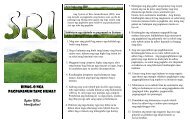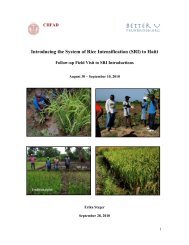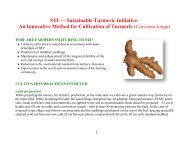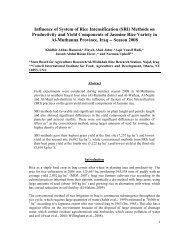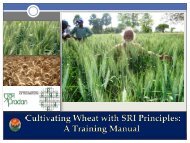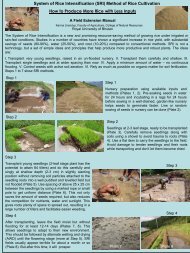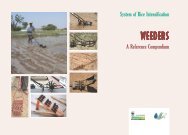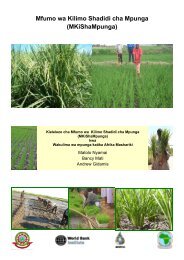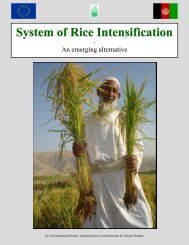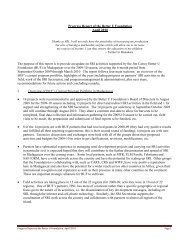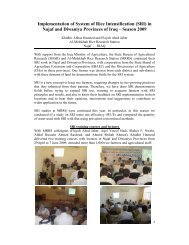EFFECT OF THE SYSTEM OF RICE INTENSIFICATION (SRI) ON ...
EFFECT OF THE SYSTEM OF RICE INTENSIFICATION (SRI) ON ...
EFFECT OF THE SYSTEM OF RICE INTENSIFICATION (SRI) ON ...
Create successful ePaper yourself
Turn your PDF publications into a flip-book with our unique Google optimized e-Paper software.
In general there are three types of development strategies, the so called paradigms, which involve or<br />
do not involve RPK (Scoones & Thompson, 1994). Three paradigms used in the recent history of<br />
agricultural development can be identified according to Blaikie et al. (1997) as:<br />
• Classic paradigm – A top-down system where TOT is based on state research institutions<br />
and technological solutions related to development issues and passed to local populations<br />
through a long line of extension workers and researchers and does not involve local<br />
knowledge at any level in the procedure.<br />
• Neo-liberal paradigm – The tools for development already exist in the target area, and are<br />
based on local market forces. Local knowledge is accepted but is not involve to any large<br />
extent.<br />
• Neo-populist paradigm – Based on participatory learning and empowerment reached<br />
through mainly Farmer Participatory Research (FPR). This paradigm involves locals in<br />
decision making and problem solving. It is the opposite of the classic paradigm as it is based<br />
on a bottom-up structure and the farmer-first concepts where farmers are involved in the<br />
entire development process (Scoones & Thompson, 1994).<br />
Pretty et al (2003) identifies three ways of conducting agricultural development through increasing<br />
one of the following situations: 1) total agricultural area in a country, 2) yield per hectare<br />
(industrializing) and 3) total farm productivity. <strong>SRI</strong> seems to belong to the Neo-Populist paradigm<br />
which fits very well with Pretty et al. (2003) scenario 3 focusing on using the local resources to<br />
increase productivity.<br />
6.3 Sustainability in rural livelihood strategies<br />
When introducing a method into a given community it will affect the livelihoods of the involved<br />
persons in many different ways and it can influence the already existing sustainability. This section<br />
briefly introduces livelihood strategies often used by RPF.<br />
Sustainability can be defined in multiple ways depending on location, participants, conditions and<br />
many other factors. Regarding sustainable agricultural systems Pretty (2000) defines it as being<br />
31



